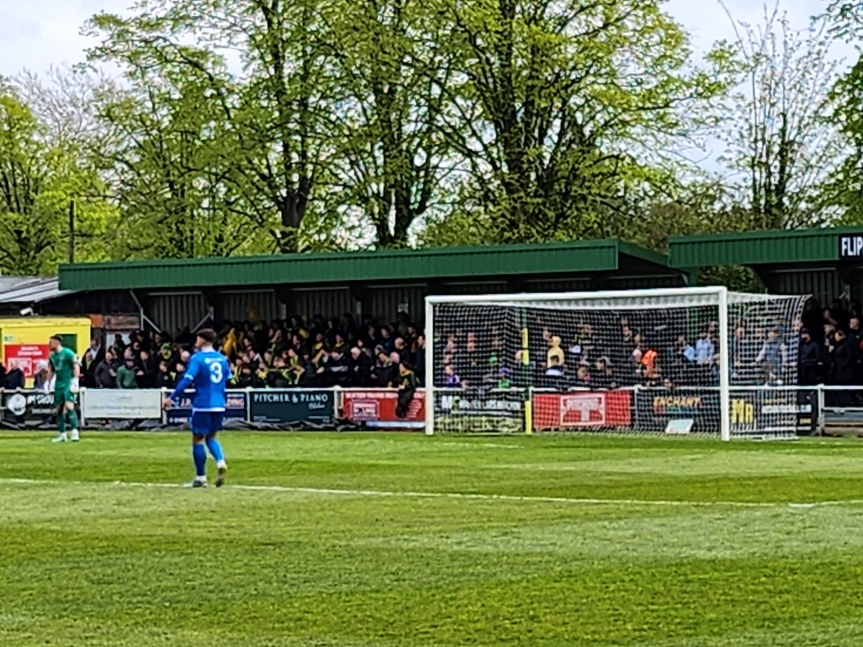IT FELT like a rather raucous wake. The bar was packed, beer was flowing, there was lots of back-slapping, laughing and joking. In the cold light of day, when the pints of lager have run from the system, the stark realisation that Hitchin Town had been relegated will sink in. It had been coming, not just this season, but at various times in the past decade. These things are often cyclical and the cycle had been running 15 years.
A team doesn’t lose 23 of 40 games because they are unlucky, a group of players cannot deliberately lose so many times, and a squad that fails to win at home for months on end obviously lacks something. Hitchin’s relegation was deserved and even the most dedicated and one-sighted of fans surely cannot contest that the outcome was almost inevitable.
If anyone wants to be sympathetic, it should be that the Canaries were unfortunate to run into one of the most inadequate refereeing performance of this and any season. Rumours abounded that he was under assessment so he was officiating according to the rule book, but in addition to that, Hitchin also lost two players to injury in the first half – Shane Bush was replaced by Joel Anker was replaced by Isaac Galliford. Then Lewis Barker was red-carded for returning to the pitch without permission after he had been forced to change his shirt due to a cut head. There was some confusion, some gestures of harsh treatment being handed out, but the referee had merely applied the letter of the law. Then one of Brett Donnelly’s bench team was sent off, but simply vaulted the fence and kept within earshot of the dugout.
Another red card was later shown to Stephen Gleeson after a bad-tempered skirmish, leaving Hitchin in the unenviable position of trying to win with nine men. Popular mythology says it is hard to play against 10 men, but there is nothing in the book of cliché about nine men. Aside from one phrase, “hopeless cause”, of course.
It never looked on for Hitchin really, no matter how much they huffed and puffed. The story of their season, really. The crowd, which was an impressive 1,100, waved their inflatable Canaries and jeered the referee whenever they could, but Stourbridge seldom looked in serious trouble until the final stages when a bullet header from departing goalkeeper Charlie Horlock was cleared off the line by a blue shirt. Some, desperately, claimed it was in the net, but who would have defended behind the line? When time is running out and a goal is needed, players plead for anything and everything.
Hitchin scurried around searching for a single goal that could have meant survival and Torin Mtege went close a couple of times, but for the fourth consecutive game, their scoresheet was blank. The final whistle went, the ground almost fell silent, the grim reaper returned to Top Field. Veteran Top Fielders shrugged their shoulders, pointed to past relegations with a little encouragement and acknowledged that the trapdoor had been open all season.
And yet, crowds at Top Field had been undeservedly high for most of the campaign. The worse Hitchin played, the more people appeared to file into the stadium. This is encouraging, but how will they feel about watching the likes of Dunstable, Aylesbury, Leighton and Hertford Town? Actually, past experience suggests a successful season at step four will not affect attendances too much and it will have minimal, if any, impact on commercial revenues. Admission prices may have to be adjusted, however.
Relegation is part of the life cycle of a football club. We have become too accustomed to success being the only thing that determines whether football (indeed, anything) is worthwhile, but not every club can be triumphant in the same season. Take the current 92 in the Premier and Football League; less than 20 clubs can experience tangible success, while a dozen will go through the pain of relegation. Being in the latter category doesn’t make that club worthless, it means that others are more success in that particular season. The margin of success is so narrow that nobody should be wringing their hands or seeing counselling because their football club has failed. As for Hitchin Town, one goal against Stourbridge would have been enough to preserve their Southern League Premier Central status. It didn’t come, but as every coach, reading from the lexicon of football cliché and jargon will tell you, “We go again”.


